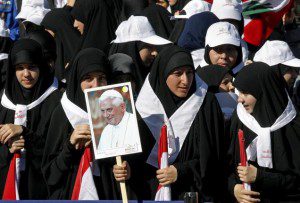As I read today about Pope Benedict XVI’s trip to Lebanon in which, not surprisingly, he called for peace, I reflected on how his words point out a common theme in Christian thought which draws on Aristotle’s concept of the virtues. Human goods are not only interior dispositions, nor are they only exterior actions. Human goods must be the alignment of interior dispositions and exterior actions.
 Is peace a state of mind or the heart? Or is peace a state of social relations? It is both. It must be both. Although it is clear that there is no peace if two parties are warring against each other, there also is no peace if one person hates another, even if he or she does not act on that hate.
Is peace a state of mind or the heart? Or is peace a state of social relations? It is both. It must be both. Although it is clear that there is no peace if two parties are warring against each other, there also is no peace if one person hates another, even if he or she does not act on that hate.
So how does one build peace in a context that lacks peace? Not only by cultivating good feelings, but also by enacting peace. That was the main message of Pope Benedict’s homily in Beirut yesterday:
“In today’s second reading, Saint James tells us to what extent our walking in the footsteps of Jesus, if it is to be authentic, demands concrete actions. “I, by my works, will show you my faith” (Jas 2:18). It is an imperative task of the Church to serve and of Christians to be true servants in the image of Jesus. Service is a foundational element of the identity of Christ’s followers (cf. Jn 13:15-17). The vocation of the Church and of each Christian is to serve others, as the Lord himself did, freely and impartially. Consequently, in a world where violence constantly leaves behind its grim trail of death and destruction, to serve justice and peace is urgently necessary for building a fraternal society, for building fellowship! Dear brothers and sisters, I pray in particular that the Lord will grant to this region of the Middle East servants of peace and reconciliation, so that all people can live in peace and with dignity. This is an essential testimony which Christians must render here, in cooperation with all people of good will. I appeal to all of you to be peacemakers, wherever you find yourselves” (Pope Benedict XVI, Beirut, Lebannon, September 16th, 2012).
Just as the letter of St. James makes clear that followers of Jesus are required to show their faith through works, so peace will only come if people are peacemakers. The debate among some Christians about faith vs. works sets up a false opposition: there is no faith without works, and if works are not done with faith, they are not Christian action. Similarly, Benedict told all people of good will that there is is no peace without peacemakers; and peacemakers won’t make peace if people don’t have peace in their hearts.
As reported in the Wall Street Journal, Pope Benedict XVI ended the Mass with these words:
“May God grant to your country, to Syria and to the Middle East the gift of peaceful hearts, the silencing of weapons and the cessation of all violence.”
This quote once again illustrates that peace, like any virtue, is in the heart and in the actions we undertake. May the words of the Pope inspire hope in a region of the world so much in need of peace in people’s hearts and in people’s actions.















